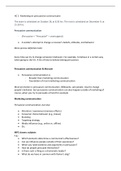HC 1- Marketing en persuasieve communicatie
The exam is scheduled on October 28, at 8.30 hrs. The resit is scheduled on December 9, at
15.30 hrs.
Persuasive communication
- (Persuasive = ‘’Persuasief’’ = overtuigend)
• A sender’s attempt to change a receiver’s beliefs, attitudes, and behavior
More precise definition later
Every time we try to change someone’s behavior. For example, to behave in a certain way
when going to the VU. A list of how to behave (being persuasive).
Persuasive communication & Marcom
• Persuasive communication is
- Broader than marketing communication
- Foundation of most marketing communication
Most promotion is persuasive communication. Billboards, sale people. Goal to change
people’s behavior. but persuasive communication can also happen outside of marketing of
course, when you try to persuade a friend for example
Marketing communication
Persuasive communication, but also:
• Attention / awareness (memory effects)
• Consumer choice behavior (e.g., biases)
• Branding
• Targeting strategy
• Media influence (e.g., online vs. offline)
• Etc.
MPC classes: subjects
e.g.:
• Which elements determine a commercial’s effectiveness?
• Can we influence people outside of their awareness?
• When you need evidence and arguments in persuasion?
• How do people persuade themselves?
• Is there such a thing as a charismatic leader?
• What do we have in common with Pavlov’s dog?
,Persuasion: application areas
• Corporate sphere, e.g.,
- Marcom, but also
▪ Sales / negotiations
▪ Motivating / leadership
▪ Online campaigns / influencers
• Public sphere, e.g.,
- Health com
- Politics. Societal debates
• Individual sphere, e.g.,
- Relations
- Education / family life
Learning goals (1)
Knowledge about theories and research on persuasive communication
• What works, what doesn’t?
• How/why does it work? (using the mechanisms)
• How do we know?
Skills to systematically analyze persuasive messages and predict their effects
Skills to persuasive anybody, might not possible. Need more skills, active skills.
Learning goals (2)
• Being able to analyze persuasive effects of:
- Sender characteristics
- Message characteristics
- Receiver characteristics
- Context characteristics
• And their interactions!
How we consider the brand? -> Brand reputation.
Practical use
Looking at ads and pick the elements that works
trying to understand the mechanisms behind persuasion is different from persuading
someone
,So…?
• You will be able to predict whether a message is effective
• You will know whether and how someone is trying to persuade you or others
• You will be able to persuade others more effectively (depending on your own skills)
Learning goals (3)
• Being able to conduct scientific research on persuasion effects (passive knowledge)
• Designing an experiment
• Measuring responses
• Testing effects
• Or at least: thoroughly understanding how researchers study persuasion effects
Mainly in the assignments, practice understanding research and research methods
Persuasive communication: scientific approach
Why do we need it?
• People often do not understand their own beliefs, attitudes and behavioral motives
• Let alone those of others…!
• We need objective evidence to understand why people change their behavior
• How do we get this evidence? (Scientific approach)
Question
• Are good-looking people seen as more or less intelligent as less good-looking people?
How do we find out?
Just ask? (e.g. in a street survey)?
‘’do you think that good-looking people are generally smarter than unattractive people, or
do you think it is the other way around?’’
(= ‘’self report’’)
Run experiment with two pictures. Which one is the smarter one? Constructed people.
Based on the poll the left one is likely to be smarter. Good looking smarter and less good
looking not smarter. Halo-effect: generally attractive people are seen as more intelligent,
more successful etc.
We are not aware of our own prejudices. Different beauty standards.
Answer
• Good looking people are seen as more intelligent, nicer, more outgoing
, • Effect: more positive responses, credible, reliable
• Effect: more persuasive!
• Effect: better (paid) jobs, nicer partners…
This is why we run experiments!
• We can manipulate the independent variable
• E.g., good vs. less good-looking
• We can measure its effects on the dependent variable(s)
• E.g., perceived intelligence
Street survey:
• Probably no relation attractiveness intelligence:
• People do not admit that they think there is a relationship (political
correctness/ social desirability)
• People are not aware that they perceive a relationship
Perloff Quiz
B: Images, it depends on the product, it depends on the person, arguments
Best answer is C.




